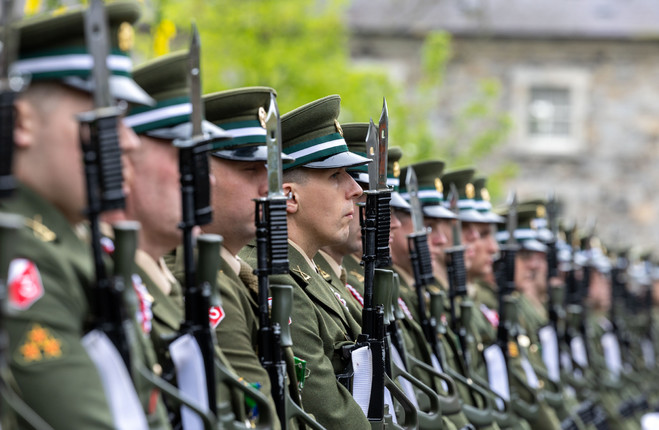PDFORRA, the group representing 6,500 enlisted members of the Army, Naval Service and Air Corps, will begin its annual delegate conference in Trim, Co Meath today.
NOT ENOUGH IS being done to implement key recommendations twelve months after the landmark Commission on the Defence Forces report was published, a conference will hear today.
Mark Keane, President of PDFORRA, the group representing 6,500 enlisted members of the Army, Naval Service and Air Corps, speaking ahead of the group’s annual delegate conference in Trim, Co Meath said key undertakings by Government must be delivered to ensure the future of the military.
The Commission on the Defence Forces looked at the capabilities of the Irish military and made sweeping recommendations for urgent institutional change and resourcing. This was followed then with a Government Action Plan.
Keane said that issues including the lack of certainty in contracts for non-commissioned ranks officers, resourcing, retention of staff and pay have not been solved.
He also said that the issue of bullying, sexual assault and harassment identified in the recently published Independent Review Group should be taken as an opportunity to bring positive change to the organisation.
The first Ombudsman for the Defence Forces, Ms Paulynn Marrinane Quinn BL, will address conference delegates on Thursday morning.
It is expected that Quinn will address delegates on the history of the establishment of her office and the initial reports of the Independent Monitoring Group (IMG), which was established following the revelations of Senator Tom Cloonan in 2001.
The IMG was a body which reported back on the efforts and progress of the Irish Defence Forces following the allegations but had not issued a report from 2014 on.
“The IRG made for stark reading everyone that has read it has been shocked by it, people are just aghast at what it says but it also needs to be remembered that the majority of the Defence Forces condemn the behaviour and believe strongly in the need to root out those who perpetrated it.
“It is not reflective of the decent hard working people and we would encourage anyone who has suffered to come forward,” he said.
Keane said that the key to solving the crisis in defence is to use the Commission report along with the IRG document as a benchmark to begin a major change programme.
“We have the corner stone that is the Commission on the Defence Forces. We are willing to engage with all key stakeholders and we have built a good relationship with the Department of Defence.
“They need to take that report and use it to begin the change needed, to give a strategy of investment that will enable the organisation to meet the three Rs, recruitment, retention and remuneration. The IRG report gives us a catalogue for change.
“It affords us a chance to look back in on ourselves. If all that is dealt with they can make the Defence Forces an employer of choice but they need to start with the three basic issues and move forward from there,” he added.
Crisis
The conference is scheduled to hear more than 55 motions on a wide variety of topics on Wednesday and Thursday, with speeches by the Minister for Defence Micheál Martin and Chief of Staff Lt Gen Seán Clancy.
PDFORRA has several motions seeking the fair and equitable introduction of the Working Time Directive and the provision of proper allowances for additional hours worked by their members.
The retention crisis in defence leads the most in the topics covered with motions seeking remedial measures to attempt to retain personnel.
The PDFORRA President said that there is a particular problem with specialists who appear to be leaving in increasing numbers.
There are a significant number of motions from the delegates representing their colleagues in the Naval Service, which has seen ships fail to put to sea due to lack of crews.
“The Minister will be fully briefed and he will listen to what is happening. He needs to take action on two key aspects: the European working time directive around working hours and a need to do something about the post 1994 contracts which will see people forced to retire ahead of time,” he added.
In November the The Journal revealed that a measure to increase the fitness of serving members in the 1990s saw contracts introduced forcing members to go prematurely.
The rule means that Sergeants who have joined on post-1994 contracts must resign when they reach the age of 50.
This problem was an issue at more junior ranks and there was some agreement to solve it but Sergeant ranks are now facing mandatory retirement.
Sergeants or Petty Officers as in the Naval Service, are senior Non-Commissioned Officer rank in the military – their role is to lead teams and implement orders by officers. They are also heavily involved in training new recruits.
The Government introduced an “interim arrangement” to allow Irish Defence Forces sergeants, who would be forced to retire prematurely at the end of the year, to stay on in service – this will run until 2025.
“This needs to be dealt with – saying to people that they are extended until December 2025 is not long enough. Our people are still worried about where that leaves them.
“They have shown huge loyalty to the State – it is time that the State repays that and at least sorts out the contract problem once and for all.
“It is not fair that it is left dangling over their heads – they need to know and they need to know now,” he added.



